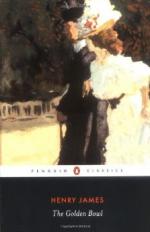She had drawn a long breath; she had made him do it all for her, and had lighted the way to it without his naming her husband. That silence had been as distinct as the sharp, the inevitable sound, and something now, in him, followed it up, a sudden air as of confessing at last fully to where she was and of begging the particular question. “Don’t you think then I can take care of myself?”
“Ah, it’s exactly what I’ve gone upon. If it wasn’t for that—!”
But she broke off, and they remained only another moment face to face. “I’ll let you know, my dear, the day I feel you’ve begun to sacrifice me.”
“’Begun’?” she extravagantly echoed.
“Well, it will be, for me, the day you’ve ceased to believe in me.”
With which, his glasses still fixed on her, his hands in his pockets, his hat pushed back, his legs a little apart, he seemed to plant or to square himself for a kind of assurance it had occurred to him he might as well treat her to, in default of other things, before they changed their subject. It had the effect, for her, of a reminder—a reminder of all he was, of all he had done, of all, above and beyond his being her perfect little father, she might take him as representing, take him as having, quite eminently, in the eyes of two hemispheres, been capable of, and as therefore wishing, not—was it?— illegitimately, to call her attention to. The “successful,” beneficent person, the beautiful, bountiful, original, dauntlessly wilful great citizen, the consummate collector and infallible high authority he had been and still was—these things struck her, on the spot, as making up for him, in a wonderful way, a character she must take into account in dealing with him either for pity or for envy. He positively, under the impression, seemed to loom larger than life for her, so that she saw him during these moments in a light of recognition which had had its brightness for her at many an hour of the past, but which had never been so intense and so almost admonitory. His very quietness was part of it now, as always part of everything, of his success, his originality, his modesty, his exquisite public perversity, his inscrutable, incalculable energy; and this quality perhaps it might be—all the more too as the result, for the present occasion, of an admirable, traceable effort—that placed him in her eyes as no precious a work of art probably had ever been placed in his own. There was a long moment, absolutely, during which her impression rose and rose, even as that of the typical charmed




